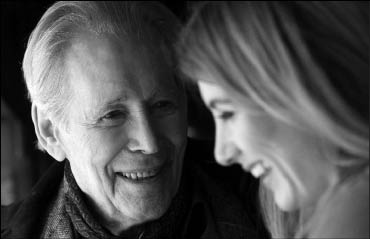Peter Principal: Venus
by M. Faust

A few weeks back, I commented in these pages that Forest Whitaker’s performance in The Last King of Scotland was as close as you could get to a sure bet at this year’s Academy Awards. Having since seen Peter O’Toole in the witty, ribald and thoroughly delightful Venus, I’d like to take that back.
(Before I go on, let me note that when I say you can bet on something, I am merely indulging in mild hyperbole and do not mean to condone gambling. More importantly, if you do gamble on events like the Oscars, for god’s sake don’t ever put down money based on my opinions. You’d do a lot better flipping a coin or snapping off a few rounds of “Eeeny-meeny-miney-mo.”)
It’s not that O’Toole’s performance is better in any qualitative sense than Whittaker’s: Both remember their lines, neither bumps into the sets, and everything after that is a matter of opinion. Handicappers might note that Whittaker has been named Best Actor by 15 out of the 16 awards and critics groups announced to date, O’Toole by none.
Still, O’Toole could well win for the same reason that John Wayne got an Oscar in 1969, beating out Jon Voight, Dustin Hoffman, Richard Burton and someone else who name escapes me at the moment: not merely because he’s a much-loved star who never quite got his due, but also because the film (True Grit, in Wayne’s case) is part parody and part celebration of his image. Whittaker probably has a lot of good work ahead of him, whereas Venus, in which O’Toole plays an aging actor, manages to draw on its star’s entire career, implying with every setup that he won’t be around much longer.
Director Roger Michell (Notting Hill) and writer Hanif Kureishi (My Beautiful Laundrette) deny that they developed Venus with O’Toole in mind. The premise, somewhat following up their collaboration on The Mother and inspired by the fifty-something Kureishi’s observation of his older friends, was simply to do a fresh take on an aging character. Having got O’Toole, though, they clearly tailored the movie to him. And the marketing department at Miramax, no slouches at Oscar-baiting, designed a poster bearing an image of the star looking so decrepit you fear he’ll die before you can get into the theater.
O’Toole looks better than that in the film, certainly, but not much. At the age of 74, he appears as if every last rumor of swinging London excess were true; you don’t get to look this weathered simply by living for a long time. The eyes still twinkle, the voice is regal and the timing of his lines impeccable, but the flesh now sags off of what was once one of the movies’ most beautiful visages. When a waitress in the film who has known him only as a cranky old customer sees a picture of him from his youth, she remarks in surprise, “He were gorgeous!” Just in case we’d somehow forgotten.
(The effect is even stronger in the scenes he shares with Vanessa Redgrave, who was also somewhat less than hard on the eyes back in the day.)
But while Venus is enriched by our memories of its star, it is by no means dependent on them. In and of itself it’s a gem as only the British can make, which makes it a bit more tart than viewers expecting to see Grumpy Old Chaps. While the most entertaining parts of the film chart the interaction of veteran actors Maurice, Ian (Carry On veteran Leslie Philips) and to a lesser degree Donald (The History Boys’ Richard Griffiths), the plot concerns Maurice’s infatuation with Jessie (Jodie Whittaker), a young woman wholly lacking in refinement. The prostate operation that has rendered him incapable has not shut off Maurice’s imagination, nor his memories, as he makes clear in dialogue that may frost the hair of the Masterpiece Theater crowd. Their loss. This is the best film role O’Toole has had since My Favorite Year, and if they want to give him an Oscar for it, I wouldn’t complain.
|
Issue Navigation> Issue Index > v6n6: Love Stories (2/8/07) > Peter Principal: Venus This Week's Issue • Artvoice Daily • Artvoice TV • Events Calendar • Classifieds |









 Current Issue
Current Issue